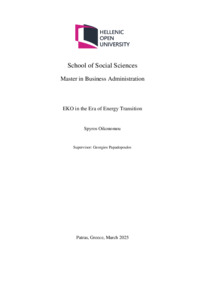- MSc thesis
- Διοίκηση Επιχειρήσεων (MBA)
- 17 Μαίου 2025
- Αγγλικά
- 91
- ΓΕΩΡΓΙΟΣ ΠΑΠΑΔΟΠΟΥΛΟΣ
- climate change, EKO, energy transition, fuels, sustainability
- ΜΒΑ
- 9
- 48
-
-
Introduction: Climate change is the most important challenge that humanity will face in
the rest of the 21st century. The transition to renewable energy sources becomes
imperative to address it, implying the use of transitional fuels until the full transition to
renewable energy sources is achieved. In this context, the European Union has from time
to time promoted policies for various fuels, such as natural gas, biofuels and, more
recently, hydrogen. The effective adaptation of fuel companies to this new era becomes
imperative for the success of the energy transition.
Objective: The objective of the study was to examine the case of EKO in the era of
energy transition.
Methodology: The research was based on a qualitative approach, using a semi-structured
interview guide. The interviews were conducted with 10 employees of the company. The
data was analyzed through thematic content analysis, followed by a SWOT analysis based
on the data.
Results: There was a consensus among participants with regard to the necessity of shifting
away from fossil fuels to transitional. Important progress has been made by EKO towards
sustainability through its investments in renewable energy sources, such as photovoltaic
parks and wind farms. The company has also expanded its network of electric vehicle
charging stations and has promoted biofuels and sustainable aviation fuels. Yet, the high
cost of implementation, the need for government support and the lack of knowledge are
important problems. Among the study participants, there is no general agreement on which
fuels should be prioritized, although some of them refer to hydrogen as highly promising.
According to the participants, the company can achieve carbon neutrality by 2050.
Through SWOT analysis, it is supported that the company has to position itself in the
hydrogen market shortly. Emphasis on research and development, the creation of
collaborations with other companies, and the company's turn towards the Balkan market
are also related opportunities.
Conclusions: EKO has made some steps, but further progress is needed to better adjust in
the era of climate change. The results of the present study could be useful for the
company’s board to improve its strategy in the era of energy transition. -
-
- Hellenic Open University
- Attribution-NonCommercial-NoDerivatives 4.0 Διεθνές


